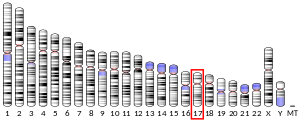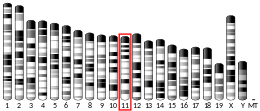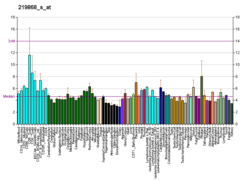ANKFY1
Ankyrin repeat and FYVE domain-containing protein 1 is a protein that in humans is encoded by the ANKFY1 gene.[5][6][7]
Function
This gene encodes a cytoplasmic protein that contains a coiled-coil structure and a BTB/POZ domain at its N-terminus, ankyrin repeats in the middle portion, and a FYVE-finger motif at its C-terminus. This protein belongs to a subgroup of double zinc finger proteins which may be involved in vesicle or protein transport. Alternative splicing has been observed at this locus and two variants, each encoding a distinct isoform, have been identified.[7]
gollark: Seems to use lunar gravity strength.
gollark: Okay, Up and Down and All Around works okay on the moon.
gollark: Scrench.
gollark: That's meant to boot off an HDD. Drones don't have HDDs.
gollark: Won't work.
References
- GRCh38: Ensembl release 89: ENSG00000185722 - Ensembl, May 2017
- GRCm38: Ensembl release 89: ENSMUSG00000020790 - Ensembl, May 2017
- "Human PubMed Reference:". National Center for Biotechnology Information, U.S. National Library of Medicine.
- "Mouse PubMed Reference:". National Center for Biotechnology Information, U.S. National Library of Medicine.
- Kuriyama H, Asakawa S, Minoshima S, Maruyama H, Ishii N, Ito K, Gejyo F, Arakawa M, Shimizu N, Kuwano R (Aug 2000). "Characterization and chromosomal mapping of a novel human gene, ANKHZN". Gene. 253 (2): 151–60. doi:10.1016/S0378-1119(00)00247-X. PMID 10940552.
- Bouslam N, Bouhouche A, Benomar A, Hanein S, Klebe S, Azzedine H, Di Giandomenico S, Boland-Augé A, Santorelli FM, Durr A, Brice A, Yahyaoui M, Stevanin G (May 2007). "A novel locus for autosomal recessive spastic ataxia on chromosome 17p". Human Genetics. 121 (3–4): 413–20. doi:10.1007/s00439-007-0328-0. PMID 17273843.
- "Entrez Gene: ANKFY1 ankyrin repeat and FYVE domain containing 1".
External links
- Human ANKFY1 genome location and ANKFY1 gene details page in the UCSC Genome Browser.
Further reading
- Nakajima D, Okazaki N, Yamakawa H, Kikuno R, Ohara O, Nagase T (Jun 2002). "Construction of expression-ready cDNA clones for KIAA genes: manual curation of 330 KIAA cDNA clones". DNA Research. 9 (3): 99–106. CiteSeerX 10.1.1.500.923. doi:10.1093/dnares/9.3.99. PMID 12168954.
- Maruyama K, Sugano S (Jan 1994). "Oligo-capping: a simple method to replace the cap structure of eukaryotic mRNAs with oligoribonucleotides". Gene. 138 (1–2): 171–4. doi:10.1016/0378-1119(94)90802-8. PMID 8125298.
- Suzuki Y, Yoshitomo-Nakagawa K, Maruyama K, Suyama A, Sugano S (Oct 1997). "Construction and characterization of a full length-enriched and a 5'-end-enriched cDNA library". Gene. 200 (1–2): 149–56. doi:10.1016/S0378-1119(97)00411-3. PMID 9373149.
- Ito K, Ishii N, Miyashita A, Tominaga K, Kuriyama H, Maruyama H, Shirai M, Naito M, Arakawa M, Kuwano R (Apr 1999). "Molecular cloning of a novel 130-kDa cytoplasmic protein, Ankhzn, containing Ankyrin repeats hooked to a zinc finger motif". Biochemical and Biophysical Research Communications. 257 (1): 206–13. doi:10.1006/bbrc.1999.0430. PMID 10092534.
- Nagase T, Ishikawa K, Kikuno R, Hirosawa M, Nomura N, Ohara O (Oct 1999). "Prediction of the coding sequences of unidentified human genes. XV. The complete sequences of 100 new cDNA clones from brain which code for large proteins in vitro". DNA Research. 6 (5): 337–45. doi:10.1093/dnares/6.5.337. PMID 10574462.
- Schnatwinkel C, Christoforidis S, Lindsay MR, Uttenweiler-Joseph S, Wilm M, Parton RG, Zerial M (Sep 2004). "The Rab5 effector Rabankyrin-5 regulates and coordinates different endocytic mechanisms". PLoS Biology. 2 (9): E261. doi:10.1371/journal.pbio.0020261. PMC 514490. PMID 15328530.

- Kimura K, Wakamatsu A, Suzuki Y, Ota T, Nishikawa T, Yamashita R, Yamamoto J, Sekine M, Tsuritani K, Wakaguri H, Ishii S, Sugiyama T, Saito K, Isono Y, Irie R, Kushida N, Yoneyama T, Otsuka R, Kanda K, Yokoi T, Kondo H, Wagatsuma M, Murakawa K, Ishida S, Ishibashi T, Takahashi-Fujii A, Tanase T, Nagai K, Kikuchi H, Nakai K, Isogai T, Sugano S (Jan 2006). "Diversification of transcriptional modulation: large-scale identification and characterization of putative alternative promoters of human genes". Genome Research. 16 (1): 55–65. doi:10.1101/gr.4039406. PMC 1356129. PMID 16344560.
This article is issued from Wikipedia. The text is licensed under Creative Commons - Attribution - Sharealike. Additional terms may apply for the media files.




